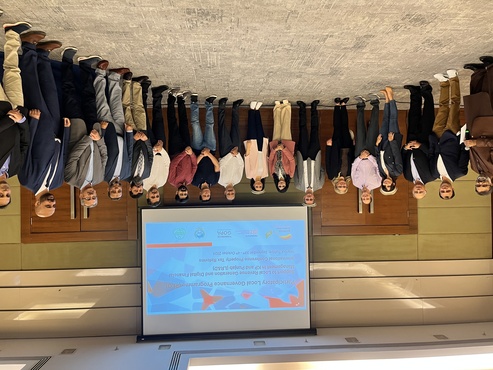Taxing Talks: Reforming Property Tax Through International Exchange

A conference in Istanbul, Turkey, focused on property tax reforms to enhance local revenue generation and the adaptation of digital financial management systems in Khyber Pakhtunkhwa (KP) and Punjab. The exchange aimed to familiarise senior government officials with international best practices and strategies for improving collaboration among stakeholders to ensure effective reform implementation focusing on digitalisation and effective valuation methods to strengthen local revenue systems in both provinces.
Key learnings/takeaways from the conference:
- Property valuation reforms must be transparent and inclusive, leveraging digital technologies like GIS and blockchain to ensure fairness and prevent disputes.
- Meaningful citizen participation is critical for legitimate property tax reforms. Mechanisms like consultations and feedback channels foster transparency, equity, and adherence, in line with international standards.
- Strong enforcement mechanisms, including clear penalties and tax tribunals, builds trust in tax systems. Use MOUs and capacity-building agreements for knowledge transfer.
- Strong regulatory frameworks are essential for efficient and equitable tax collection. Amendments to tax codes and valuation standards should reflect principles of equity, efficiency, and fiscal decentralisation.
- Tax authorities need comprehensive toolkits with SOPs, digital tools, and benchmarks, to ensure operational efficiency and accountability.
Diverse participation for rich dialogue
The conference brought together sixteen stakeholders from KP and Punjab, including senior management from excise and taxation, finance, and local government departments to discuss property tax administration. Experts from Punjab’s Excise & Taxation Department (ETNCD) joined virtually to share insights on evolving property valuation models.
Property tax and tax digitalisation experts and moderators encouraged collaborative dialogue through presentations and group works on topics such as:
- Institutional arrangements for property taxation
- Property taxation in Punjab and KP
- Criteria for successful property taxation reforms
- Digitalisation of property taxation in developing countries
- Experiences and lessons on property valuation and taxation
The conference also showcased relevant case studies from a range of countries, including:
- Ethiopia, Ghana, and India: Insights into their unique property tax systems and reforms.
- European Models: Presentations from Germany, France, the UK, Norway, and Sweden highlighted diverse approaches to property taxation.
The Dakar example underscores the transformative impact of linking property taxes directly to public services, demonstrating how effective citizen outreach by local governments can significantly enhance voluntary compliance.
‘The Dakar example clearly highlights how local governments’ outreach to citizens, while clearly linking property tax with public services, can significantly improve voluntary compliance. Punjab and KP’s ETNCDs and local governments should collaborate on communication and outreach efforts with a clear focus on the services funded by property taxes”, says Ms. Asia Gul, Special Secretary, Local Government & Community Development Department, Punjab
Participants also engaged in group work to compare the property tax situations in KP and Punjab against the international benchmarks discussed.
Mr. Fayyaz Ali Shah, Secretary ETNCD KP remarked, “Case studies highlighted the value of tools like GIS mapping and mass valuation for property assessment. KP ETNCD is collaborating with universities in Peshawar to bring GIS expertise alongside our IT and property tax teams’.
A Field Trip to Beşiktaş Municipality
Officials also visited the Beşiktaş municipality in Ankara to learn about Turkey's property tax system and challenges, including rising court cases. Unlike Pakistan, Turkish municipalities have stronger enforcement powers, such as attaching bank accounts of taxpayers in arrears.
The study tour was organised by GOPA Worldwide Consultants with the support of the German Federal Ministry for Economic Cooperation and Development (BMZ), through the Participatory Local Governance (PLG) programme implemented by GIZ Pakistan. PLG supports the provincial tax authorities and local governments to strengthen the property tax systems and improve local revenue generation with the overall goal to improve public service delivery.